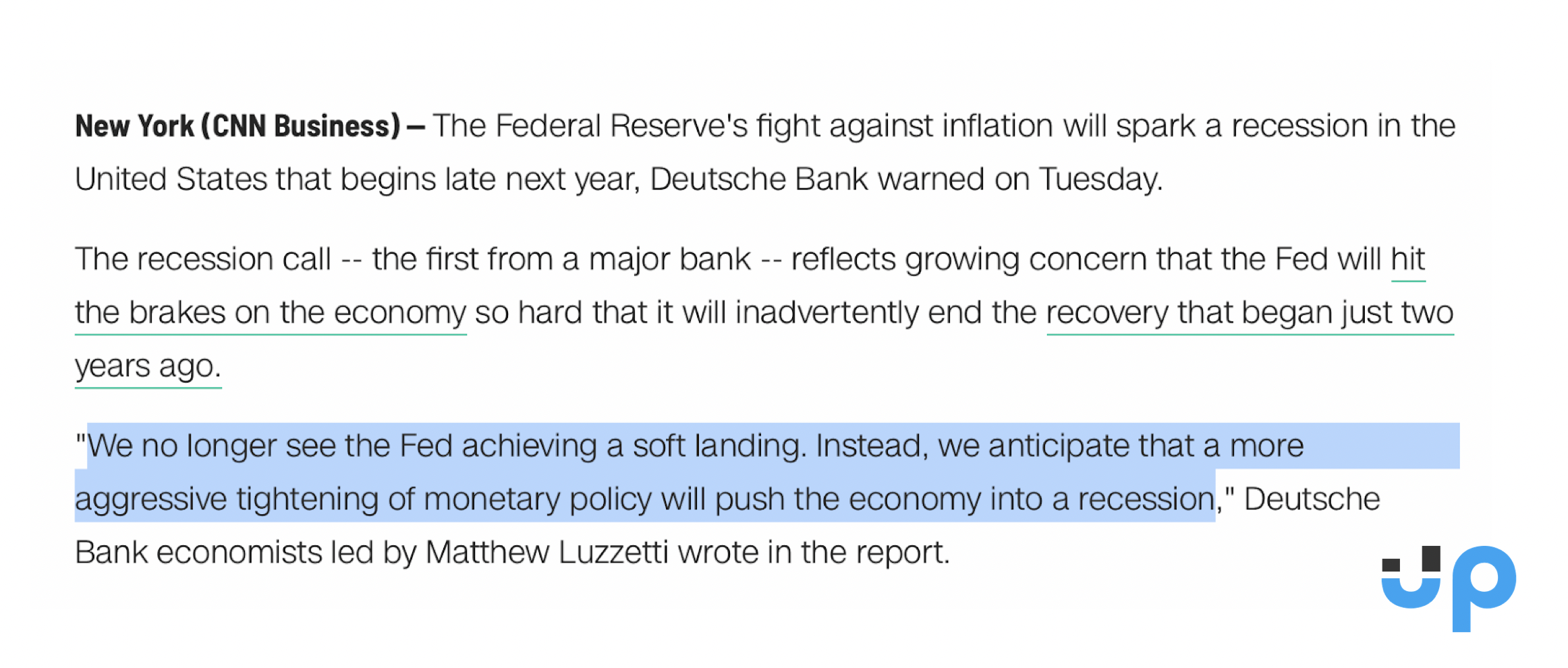A Recruitment Optimization Guide
This is our deep dive into recruitment costs optimization and why cutting it in half is not the way.
6/23/2022Read 8 min.

A Recruitment Optimization Guide

This is our deep dive into recruitment costs optimization and why cutting it in half is not the way.
6/23/2022Read 8 min.
During the last six months, bright minds of the financial and tech world started talking about recession. We won't be diving into the economic details of this process because we are more interested in how this will affect the IT industry.
Board meetings of NASDAQ companies which have become more frequent in recent weeks, raise the topic of cost optimization. When the market grows, companies spend money, and when it falls, they "cover it's air." Less business class travel - more Zoom calls. Less corporate parties - more investments in sales. Fewer bonuses - more optimization.

One of the first cost items that get cut is recruitment. We'll not call it optimization because it's literally cutting, not optimizing. But before talking about it, let's briefly dive into history.
We now have a culture of efficient recruitment that focuses on business objectives. But it wasn't like that. Before, processes were more straightforward, a search was more like a routine, and the skills to do the recruitment business were a little low. It took years for companies not to mix recruitment and office management in one person's role. Or making HR do the recruitment, forcing them "to juggle all seven things at once while sitting on a unicycle."
Hiring a Senior takes seniority: understanding tech stack, market knowledge, empathy, ability to communicate in written form, and sales skills. Now, when hiring becomes more complex, a good recruitment manager should also understand how to manage the employer's brand. He can communicate on behalf of the company correctly, evaluate candidate's perception, see the weaknesses, and offer how to manage them.
All these components justify the high cost of work for the recruiting team.
Ok, back to reality. Recruitment is being cut: we see that in the news, other companies do that, and your company may also plan it. And if that is inevitable, let's discuss how to do it properly.
Where not to start
Salary
Let's say you are looking for Senior developer for market-average pay. You find the candidate and like him, but you try to agree on a little bit more minor salary than you planned. Just to save some cash. And it works, so you can save up to $10 000 a year. Seems like a legit result.
Five months go by, and your competitor hunts this developer, offering him more money. He agrees because he has a family to provide for, so he's gone.
Now, a math minute:
💸 On average, to close a Senior position, the company spends around $4000 per candidate, not including recruitment team costs.
💸 Recruitment team costs $5000 more (or even $10 000).
💸 Promotion costs eat up $800 more.
So you spent somewhere around $9800 to hire the candidate. But when he left, you had to do the hire again. That will cost $9800 more. So you spend $19 600, with an initial economy of $10 000.
You lost $9600.
And if we consider that candidate left after five months of work, not the year, you lost $15 400. Bummer.
Benefits
The risks of cutting down benefits are pretty similar to the salary. You make the possibility of leaving you for the competitor pretty high. Cutting down essential benefits always leads to internal conflict. Cutting down education costs will harm the company in the long run because education usually leads to revenue growth (but later)
You can think that the chances that this move will be effective are 50/50: it can save you a lot of money, or it can be a shoot in the team's leg. But there is a way out - we'll talk about it later.
Recruitment Promotions
Cutting down promotion costs can work if before, it was just throwing money in not very efficient channels of promotion. But most companies spend a couple of hundred dollars, so even if we exclude this cost from the equation, it won't influence anything.
There are no ways to replace advertisement costs for something free because you can't get the same reach. So $100-200 economy sounds like a recommendation not to buy coffee to cut own spending. It will decrease them, but you will not be more efficient. And won't be happier.
Recruitment Team Fee
The Holy Graal of recruitment optimization. It's like tequila at the party - when sh*t has become real, everyone starts optimizing recruitment fees
Let's get back to our brief history lessons: times of recruitment-office managers are gone. The recruitment manager is responsible for collecting the best possible team that will do the project. They should have mad skills and a vision even bigger than the founder has. The recruiter seldom has the right to be wrong because he has to hire candidates fast and precisely. Furthermore, a recruiter is almost like a business consultant, so his rate should be appropriate.
To keep things simple, let's do some calculations. Let's say that hiring a Senior developer costs a $6000 recruitment fee. You wanna cut it down a bit, up to $5000, because 15% discount seems reasonable.
But the math doesn't work like that here. Senior recruiter works on one position for a lot of days. He uses software, subscriptions, and platforms that cost him money. He has a lot of overheads that he need to cover anyway. The cost structure of his team is complex, risks are high, and vacancy estimates volatility is huge. That's why there's not much profit in $6000. It can be somewhere around $1500. And $1000 discount is not 15% for him - it's 66%.
But a discount is not only about money - it's about how you view the world. 66% discount can be a 66% decrease in efficiency and diligence. The human psyche works like that - remuneration is always tied with effort and result. So you can get the discount, but don't be surprised if a recruiter isn't highly motivated.
How to optimize recruitment and HR right
Start with the business process
Don't focus on recruitment if you want to make recruitment more effective and cut costs. Check the overheads you can reduce or throw away to cut the costs.
For example, in 2022 remote work is not only possible but absolutely normal. Remote is the new Black. If you are able to build decentralized, remote work, you will save thousands of dollars on rent, utilities, office management, commute, food, and so on. Even if your company compensates the bonuses the team doesn't receive, you will still spend less.
Part of your team needs an office? Not a problem. We calculated that renting coworking spots is 4-5 times cheaper, than renting an office for the same team. Plus, you don't spend on office utilities or security and hold no risks.
Scale your geo
You can save around 30% at every hire by searching not in US but in Ukraine, Georgia, or Azerbaijan. Hard and soft skills are the same, and sometimes higher, but salary, benefits, overheads, and taxes will be lower.
By the way, you can calculate recruitment cost and savings in our True-cost calculator. Check it out.
Hire an expensive recruitment team
Yeah, not that obvious, we know. But let's clear one principle: you pay a lot for recruitment when an inexperienced team makes it. The longer the vacancy is open, and the more CVs you need to check, the bigger the hiring cost. Treat every action of the team involved in the hiring process as an expences. Looked for a couple more CVs - lost money. Conduct a couple more interviews - lost some more money. Every action is a loss, so an expensive team that gets sh*t done is actually cheaper.
Summary
We can compare recruitment with a house reparation. If you made it at least once, you should remember the struggle.
Recruitment cost optimization - is like house reparation optimization. You can buy cheaper wiring, but in case of shortage, you'll have to change all electrical communications. You can hire a cheap electrician, but he will need to be supervised so he doesn't screw up. And it will take three weeks, not three days, to lay the wiring.
However, suppose you decide to do the job right. In that case, you won't spend money on the second construction team, replacing pipes or electricity in two years, or end up in a noisy environment because of poor sound isolation.
Let's optimize expenses to pass economic difficulties with dignity. However, let's keep the future perspective your strong team will help you reach in mind.
Have questions?
Fill the form, and we will provide you with FREE consultation
Have questions?
Fill the form, and we will provide you with FREE consultation
Do you have any questions?
Fill out the form and we will schedule a free consultation
Do you have any questions?
Fill out the form and we will schedule a free consultation
Popular

Nextiva Case-study: How to hire a team of 110 in 12 months
11/16/2022Read 4 min.Read more →
How to hire in a startup, IT outsource and product
6/5/2022Read 4 min.Read more →
The Rules of the Recruiting Game in 2022
6/5/2022Read 7 min.Read more →
What is the real cost of your hires?
6/7/2022Read 3 min.Read more →
A Recruitment Optimization Guide
6/23/2022Read 8 min.Read more →
Century Games: How to hire for a no-name company
11/24/2022Read 4 min.Read more →
Read more

How to hire in a startup, IT outsource and product
6/5/2022Read 4 min.Read more →
The Rules of the Recruiting Game in 2022
6/5/2022Read 7 min.Read more →
What is the real cost of your hires?
6/7/2022Read 3 min.Read more →